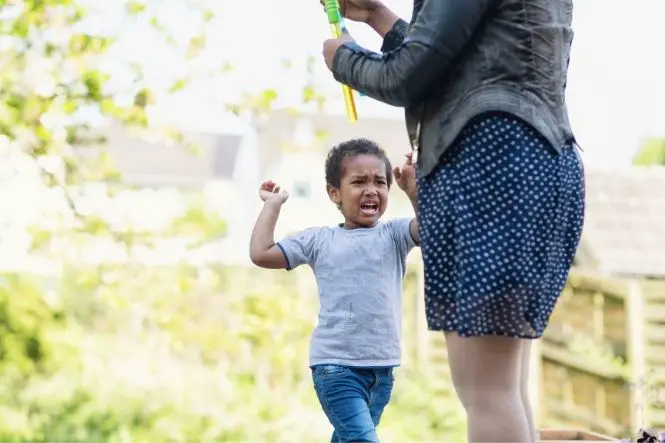The toddler phase is a time of dependence, communication, and curiosity. It can be a fascinating time as your child starts to develop precisely who they want to be and what interests them. But it can also mean that suddenly they don’t need as much attention from their parents and may even voice opinions that catch parents off guard. However, this doesn’t mean that they hate you.
Part of being a toddler and developing is trying to discover their own emotions and how to express them. This is why sometimes tantrums are thrown, and mood swings have been incredibly quickly and are very intense. Your child doesn’t yet know how to communicate how they feel correctly, so that they may go to extremes. However, their fierce anger isn’t necessarily towards you.
Toddlerhood is also a time of drastic mental development. Your child will be more independent and discover their own personality, which means that any time you may try to enact control as you did when they were younger may cause them to flare up in their emotions. They can decide that they don’t like a food one day and create a bad day for everyone involved.
Table of Contents
Why It Seems Like My Toddler Hates Me
The most common reason I may seem like a toddler hates you is that they haven’t learned how to control their emotions. Toddlers will behave in unpredictable and intense ways when they feel a certain way, which means that when they feel angry, they feel fierce anger. It may seem like they’re lashing out at you with their emotions when in fact, they are learning.
Toddlers will experience frequent mood swings as they start to discover how to express and regulate their emotions. It can create more difficult days as toddlers can suddenly switch from being happy and content to feeling extremely angry towards those around them. You must remain a patient and calm force within the tantrum or argument that ensues.
Toddlers are also a phase where they’re trying to figure out who they are, including things they like and dislike. As they try to determine precisely what they want their personality to be, it can seem hectic when they suddenly switch things that they’re interested in or don’t like the same things they used to. Try to be patient and go with the flow.
Some of the reasons that your child may act like they hate you or say that they hate you are cold
- Not giving them a snack in the way that they want you to. This means that you’re breaking some kind of routine in their brain, making them upset.
- Not being able to eat a snack or play with a toy easily. This may make the toddler feel like they have to ask for help which goes against the independence they are trying to build.
- Not letting them jump on furniture. You are enforcing rules on them which means that they can’t follow their curiosity or what they enjoy, which can cause them to be upset.
- Making them a meal. This could be because they want to participate in some other activity, and instead, you insist that they sit down to eat. It can also be because they don’t get to decide what they’re eating.
- Touching or interacting with a specific one of their toys. Toddlers can start to feel territorial, especially about things they own, such as favorite toys. Breaking this boundary can irritate them and cause them to act out angrily.
- Telling them to get off the furniture or countertops. Toddlers can see this as restricting their ability to move around and explore different parts of their environment.
- Flipping a light switch before they get to try. This goes back to a toddler’s need to explore and feed their curiosity. Your total will probably want to figure out what happens when they touch the light switch on their own rather than seeing you do it for them.
- Bumping into or having furniture get in the way of an activity they are trying to participate in. This could be a throw rug getting in the way of them playing with a specific toy or having a chair be in the way of them trying to do some kind of activity. They may insist that you move something out of the way for them, and if you don’t, they could get agitated.
- Wiping their nose. Having any interaction with their face could be seen as a violation of a personal boundary. As your toddler develops their independence, they will build their boundaries and things that they are comfortable with within their personal space. Not adhering to those boundaries could cause them to get frustrated.
Most of the reasons you will find your toddler acting as if they hate you or saying that they hate you are trying to control what they’re doing, or you are deviating from what they expect. Toddlers are developing a sense of self and expression, but they lack the empathy to see their parents as individuals.
Why Do Toddlers Reject Their Mothers?
Toddlers are in a phase where they are struggling to express and control their emotions. It may seem like they reject their mothers because they want independence. Mothers tend to be caregivers who want to do and participate in what their children are doing. A child may see this as their mother trying to control them when they want independence.
Once toddlers start to develop their personalities are going to be like, they tend to want to separate themselves from those who wish to control what their actions are going to be. This could be something as simple as choosing what they’re going to eat for lunch or telling them that they can’t do certain activities. This can cause them to reject being around their mothers.
However, in the next instant, your toddler may be asking for their mother’s comfort. It’s essential not to take these spurts of anger or rejection too personally, as chances are the child doesn’t mean it in the long run. Your toddler is just trying to be their independent person who gets to choose their actions and routines.
What to Do When Your Toddler Doesn’t Like You
Your toddler may go through phases where they act as if they don’t like you or favoring one parent over another. You mustn’t let your feelings get hurt to the point of withdrawing from your child. Introduce new activities that you can do together that your toddler will find fun, and don’t react to them trying to hurt your feelings.
The best thing you can do when your child is acting up or behaving as if they don’t like you is patience. Toddlers rarely stick to a single feeling for very long, and chances are within a few moments and will decide that they enjoy your company again. Try not to take it personally, as toddlers don’t have the best sense of empathy.
Continue to Support Them
When your toddler is acting like they don’t like you, the best thing you can do is not to show that your feelings are being hurt and not withdraw from your child. Having an adverse reaction or separating yourself from your toddler will only make them cling to other people more. Let your toddler know that you are still there for them and continue to support them.
Start a New Activity Together
Starting a new fun activity with your toddler can also be a way of rebuilding the relationship between you. Starting New Traditions such as going to a farmers market on the weekends or collecting leaves while going on a walk can create one-on-one time wear your toddler can feel as if they are genuinely bonding with you. It can also ensure you are getting time alone with them.
Don’t React Negatively
It can be hard enough to show that your feelings are hurt when your toddler seems to favor one parent over another or is showing some kind of negative emotion toward go. However, showing a bigger reaction means that your toddler is more likely to continue making hurtful comments or giving attention to the other parent. Toddlers like to see what control they can get away with.
Take Turns Being’ Good Cop’
If you’re raising your child with another parent in the household, it may be advantageous to alternate which parent is giving discipline to your child. If your child starts to associate one parent with discipline, they are more likely to withdraw from them and favor the other parent who doesn’t discipline them. Having a balance between the two can mean that your child won’t resort to favoritism.
Make Time for Them
Toddlers are more likely to favor whoever they end up spending the most quality time with. While you may have a job that requires you to be away from the house for a long time, or you may be doing chores around the house, try to incorporate fun time with your child. If you’re cooking dinner, perhaps you can have them in the kitchen with you or participate.
If your toddler knows that they can have fun and do different activities with you, they will want to continue to participate in those activities. You’ll find that chores like cleaning up the house or going shopping can be a fun outing with your toddler. You can even do activities specifically with them, such as reading bedtime stories.
Is It Normal for a Toddler to Prefer One Parent?
Commonly, a toddler will prefer one over the other in households with two parents. Sometimes, this has to do with the parents’ roles, such as staying home as a caregiver while the other works. Other times, they associate one parent with discipline and the other with fun activities.
There’s no need for you to panic if you suspect that your toddler favors one parent over you. Chances are, this is because they are associating you with a specific parent role. If you are the parent who works long hours or is in charge of doing certain chores around the house, then you might not be spending as much time with your toddler as you might think.
It may also be that they see you as the stricter parent in charge of discipline or enforcing rules. If you aren’t spending a lot of quality time one-on-one with your child, then they might only think of you as someone who enters to tell them what they can’t do. Ensure that you are sharing the responsibility is of upholding the rules in your household.
What If You’re the Preferred Parent?
If you find yourself as the preferred parent, but your partner is the one your toddler is ignoring, then you must support your partner while doing activities with your toddler. Ensure you include the other parent in some kind of activity or defend them if your toddler says anything negative. Show how much you enjoy being around your partner to be a role model.
You can also emphasize the differences between you and your partner and what kind of things are the same. Take the time to brag about how great your partner is and what they’re better at doing than you. If you’re cooking a meal around your child, talk about how you wish your partner were there to cook instead because they’re better at it than you.
It could be best to start by doing activities together with both parents present with a child. That way, they’re more likely to participate in the activity because their preferred parent is there, but it also gives a space for you to show how much fun your partner is as well. This could be as simple as going for walks together or reading a bedtime story.
Conclusion
In most cases, the reason that it might seem like you are toddler doesn’t like you is because they’re currently going through a phase where they’re discovering how to express their emotions adequately. They’re finding their independence and who they are as individuals, which means they’re more likely to get frustrated if they feel like someone is controlling their actions.




